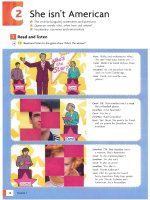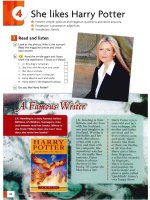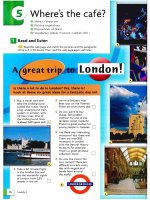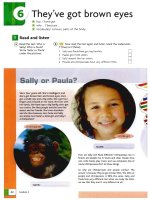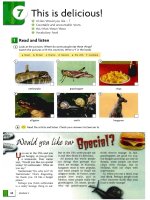Ready for FCE (Student's book Unit 4)
Bạn đang xem bản rút gọn của tài liệu. Xem và tải ngay bản đầy đủ của tài liệu tại đây (8.09 MB, 9 trang )
42
42
Vocabulary 1: Films
1 Look at these film posters. Do you know any of these films? What type of film is each
one? Choose from the words in the box.
thriller horror film comedy romance historical drama
science fiction film action film western
2 For exercises A and B, decide which word best fits each space.
A terrible terrific terrifying
1 It was a ___________ performance, for which he deserves to win an Oscar.
2 Absolutely ___________ ! I ’ve never been so frightened in all my life.
3 This was probably the worst film I’ve seen all year. The plot was non-existent and
the acting was ___________ .
B review criticism critic
It seems that every (1) ___________ I read of this film gives a different opinion. For
example, the (2) ___________ who writes for The Times is very enthusiastic about it
and has nothing but praise for George Lucas. The same director, however, comes
under strong (3) ___________ in the magazine Premiere.
4
A good story
9780230027602_FCE_WOKEY_PP001_2342 42 30/11/07 17:31:43
43
43
A good story 4
3 Read the following review of ‘The Matrix’, which appeared in a student magazine.
Does this type of film appeal to you?
4 Complete each gap 1–8 using the underlined words from the review of ‘The Matrix’.
Do not change the words in any way. There is an example at the beginning (0).
scenes
0 Some of the __________ in Casablanca are memorable, particularly when Humphrey
Bogart and Ingrid Bergman say goodbye at the end of the film.
1 The Remains of the Day is __________ in England in the 1930s.
2 The film has an international __________ , with French, Polish and Italian actors.
3 One of my least favourite films is Notting Hill, which __________ Julia Roberts as a
world-famous film actress.
4 I found Hugh Grant irritating in the __________ of a nervous bookseller who has an
unlikely romance with the film star.
5 This was not Kevin Costner’s most convincing acting __________ .
6 The __________ is straightforward and easy to follow.
7 The __________ were well portrayed by Antonio Banderas and Anthony Hopkins,
but some of the supporting roles were rather disappointing.
8 SFX is the abbreviation for __________ .
5 Talk about the following using some of the vocabulary in exercises 1–4.
• a film you didn’t enjoy • the most frightening film you have ever seen
• your favourite film • the most exciting film you have ever seen
Language focus 1:
So
and
such
Look at these two sentences.
I was so impressed with the soundtrack of the film that I
went out and bought the CD the next day.
She has such a wonderful voice that it seems a shame to
dub her films into English.
Why are so and such used in each of these sentences?
What types of words follow so and such?
Check your ideas in the Grammar reference on page 209.
Practice
For Questions 1–4 complete the second sentence so that it has
a similar meaning to the first sentence, using the word given.
Do not change the word given. You must use between two
and five words, including the word given.
1 We decided to see the film because it got such good
reviews.
that
The reviews for the film __________________ we decided
to see it.
2 The weather was so bad that we decided to come home.
such
It ___________________________ that we decided to
come home.
3 I got so bored during the film I fell asleep.
such
It ___________________________film I fell asleep.
4 The party was so crowded we could hardly move.
so
There ________________________people at the party
we could hardly move.
‘The Matrix’ is one of the most entertaining science fiction films I have
seen. It combines frenetic action with terrific special effects, and stars
Keanu Reeves as Neo, and Laurence Fishburne in the role of Morpheus.
The film is set in the future, in a world controlled by machines. In order to
hide this reality from humans, the machines have constructed the Matrix,
a vast virtual reality system resembling Earth at the end of the twentieth
century. The plot, which focuses on a revolt led by Morpheus against the
Matrix, is complicated and at times confusing. However, the cast is very
strong and the film features a surprisingly competent performance from Keanu Reeves.
As for the visual elements, the special effects are stunning, with the main characters walking on walls and avoiding machine
gun bullets. The action scenes, which include a wide variety of kung fu techniques, are convincingly choreographed.
I would recommend the film to anyone who likes science fiction. If you ignore the complexities of the plot and just enjoy the
action, you will not feel disappointed.
THE MATRIX
9780230027602_FCE_WOKEY_PP001_2343 43 30/11/07 17:31:48
44
Word formation: Adjectives ending in
-ing
and
-ed
To describe how we feel about something or someone we can use past participles
as adjectives.
I got really frightened when I saw the main character being killed.
To describe the thing or person that produces the feeling we can use present
participles as adjectives.
It was an extremely frightening scene.
Adverbs can be formed from present participle adjectives.
Not surprisingly, we were disappointed that we couldn’t get tickets to see the film.
1 Look back at the review of ‘The Matrix’ and find examples of adjectives and adverbs
formed with -ing and -ed. Note that not all the words ending in -ing and -ed in the text
are adjectives.
2 Put the past participle of each of the following regular verbs in the appropriate group,
according to how the -ed ending is pronounced.
annoy frustrate tire disappoint disgust astonish
amuse fascinate bore impress frighten relax terrify
/d/ /t/ /id/
surprised embarrassed excited
3 The present participle (-ing) form of the verbs in exercise 1 can all be used as
adjectives, except in the case of one of the verbs. Which one is it and how is the
adjective formed?
4 Complete each gap with the present or past participle form of an appropriate verb
from exercise 2. You may need to use an adverb.
1 Teachers need long holidays. They do a very _____________ job.
2 I’m sorry, but I’m just not _____________ . I don’t find it at all funny.
3 I wish you’d stop whistling. It’s extremely _____________ !
4 My mark in the exam was _____________ low. I thought I had done much better.
5 I find the whole subject of genetic engineering extremely _____________ . I really
would like to read more about it.
6 I’m not eating that – it smells _____________ ! What is it?
7 _____________ , she was still alive after spending 20 days buried under a building
which had collapsed in the earthquake.
Reviews
Your teacher has asked you to write about a film you have seen recently on DVD for
the school’s English magazine. Write a review for the magazine, giving your opinions
on the film and saying whether you would recommend it.
44
4 A good story
FCE Part 2
Writing 1:
Now you are ready to write your review in 120–180 words.
How to go about it
Here is a paragraph plan for your review.
However, the paragraph summaries are not
in the correct order. Look again at the review
of ‘The Matrix’ and put them in order.
a A brief summary of the plot and
comments on the acting, with
opinions.
b Recommendations with reasons.
c A general opinion of the film, together
with some factual details
eg type of
film, actors/actresses, director.
d Other aspects of the film together with
opinions.
l Decide on the film you are going to
review and make notes for each of your
four paragraphs, using the above plan as
a guide.
l Include relevant film vocabulary as well as
some participle adjectives to express your
opinion.
l Work with a partner and tell each other
about your films, following the notes you
have made. Have you each included a
balance of information and opinions?
9780230027602_FCE_WOKEY_PP001_2344 44 30/11/07 17:31:48
45
45
Talking about photos
FCE Part 2
Speaking:
Student A The following two photographs show different types of entertainment.
Compare these photographs and say why people enjoy activities like
these.
Student B When Student A has finished, say whether you enjoy these forms of
entertainment.
Now change roles.
Student A The following two photographs above show different types of cinemas.
Compare these photographs and say what the advantages and
disadvantages are of watching films in cinemas like these.
Student B When student A has finished, say in which of the places you would
prefer to see a film.
A good story 4
Don’t forget!
Student A
l Compare the photos. Do not describe
them in detail.
Student B
l Your comment should be brief but you
do have time to give reasons for your
feelings or opinions.
What are the advantages and disadvantages of watching films in cinemas like these?
Why do people enjoy activities like these?
9780230027602_FCE_WOKEY_PP001_2345 45 30/11/07 17:31:50
46
Preparing for listening: Focus on distractors
1 Match each sentence beginning 1–5 with an appropriate ending a–e.
1 My brother was so scared he a we can expect a certain amount of rain
couldn’t watch the film later on.
2 Although most critics agreed that b in this one he’s definitely the good guy.
the film was her best ever c whereas I didn’t find it at all frightening.
3 Although snow is now unlikely d I was rather disappointed by her
4 My daughter wanted me to help her performance.
with her homework e but I told her to ask her mother.
5 Whereas in most of his other films he
plays the ‘baddie’
2 Now decide on the correct alternative in each of the following interpretations of the
sentences in exercise 1. Give reasons for your answers.
The speaker in sentence…
1 A was frightened by the film. B was not frightened by the film.
2 A loved the film. B was not enthusiastic about the film.
3 A says it will probably rain. B says it will probably snow.
4 A helped his daughter. B didn’t help his daughter.
5 A says the actor is the villain. B says the actor is the hero in the film.
The incorrect answers in exercise 2 are typical of the distractors you might find in a
Part 1 Listening task. The ideas in them are similar to the information in exercise 1
but not the same. Note the use of contrast linkers, written in bold.
Multiple choice
1.14–1.21
You will hear people talking in eight different situations. For questions 1–8, choose the
best answer, A, B or C.
46
4 A good story
Don’t forget!
In this Part 1
exercise you will
hear distractors of
the type you met
in the Preparing
for listening
section.
1 Listen to this woman talking about an
actor. What is her opinion of him?
A He is handsome.
B He is fashionable.
C He is rude.
2 You overhear this conversation
between two friends. What type of film
are they going to see?
A an historical drama
B a romance
C a thriller
3 You hear a conversation in a video
hire shop. How long has the customer
had the video for?
A one day
B two days
C three days
4 You hear an actress talking about her
performance in a play. How does she
feel?
A tired
B disappointed
C excited
5 You overhear this man talking on the
telephone. Who is he talking to?
A an old school friend
B a work colleague
C a relative
6 You hear a young woman talking to
her friend about a film. Why didn’t she
like it?
A It was too slow.
B There was too much violence.
C It was very predictable.
7 You hear a woman telephoning a
bookshop. What is she doing?
A making a complaint
B making a suggestion
C apologizing
8 You hear this young man talking on
the phone. What does he have in
common with his girlfriend?
A They were born under the same
star sign.
B They share the same taste in music.
C They have the same sense of
humour.
FCE Part 1
Listening:
9780230027602_FCE_WOKEY_PP001_2346 46 30/11/07 17:31:51
47
47
A good story 4
Vocabulary 2:
Take
A Phrasal verbs with take
Like get, which you saw in Unit 1, take can be used in many different phrasal verbs
and expressions.
1 What is the meaning of this phrasal verb from the listening?
I took [the video] out on Saturday.
2 Read the following short story and give it a title.
I a) take after my father in many ways,
particularly in my love of good food and
a tendency to eat more than I need to.
However, several years ago the situation
had reached crisis point – my clothes no
longer fitted me – so I decided to b) take
up some form of sport. Karate seemed
like a good idea, so I signed up for a
course at the local sports centre.
I c) took to it immediately and by the
end of the first class I was hooked. Over
the next four years I progressed through
the different levels until two years ago I
achieved my ambition and qualified as
an instructor. And now the same sports
centre where I started all those years
ago has just d) taken me on as a full-
time karate teacher. What’s more, they
needed someone to e) take over from the
man who was my very first teacher and
who has left to set up his own gym. I am
certainly very grateful to him!
Now, what with training, competitions
and the classes themselves, karate has
become my life and
f)
takes up all my
time. I still manage to go out for a good
meal now and again though!
3 Match each of the underlined phrasal verbs in exercise 1 to one of the meanings in the
box below. Use the context of the story to help you.
employ start doing resemble occupy start to like replace
B Expressions with
take
1 Complete each gap 1–8 with an appropriate form of the verb take.
A 1 My dad used to _____________ me to school, but now I have to get the bus.
2 A pair of shoes should last longer than two months. If I were you, I _____________
them back to the shop.
B 3 I lost money on that business deal! Of course I regret _____________ his advice!
4 She criticizes everybody else and refuses _____________ any of the blame herself.
C 5 If you ____________ more interest in the children, they’d probably respond better!
6 The stray cat was looking a lot healthier. It was clear that someone _____________
pity on it and given it something to eat.
D 7 Street luge _____________ a great deal of courage. You wouldn’t catch me doing it!
8 Come on! I can’t understand why you _____________ so long to do this exercise.
2 In each of the sentences in exercise 1, identify the expression with take and underline it.
Example: Who is taking care of the children tonight while you’re at the party?
3 The expressions in exercise 1 are organized into four groups, A, B, C and D. Match
each of the following general meanings for take to an appropriate group.
1 to express what is needed or required
2 to talk about the movement of something or someone from one place to another
3 to talk about the way people feel or react to others
4 to accept
4 Which group in exercise 1 do the following expressions belong to?
to take pride in something to be taken to hospital
to take a joke to take the infinitive
5 Now write a short story of your own using at least three expressions and three phrasal
verbs with take.
9780230027602_FCE_WOKEY_PP001_2347 47 30/11/07 17:31:51
48
48
4 A good story
Gapped text
1 Look at this photo of an examination centre.
How many invigilators can you see?
What different duties does an invigilator have to perform on the day of an exam?
What do you think the job is like?
2 Now read the extract and compare your ideas in exercise 1 with the text.
What exam are they sitting for?
FCE Part 2
Reading 2:
He was invigilating the exam in the Casa de Cristal, a huge
glass-fronted building on the edge of the city used twice-
yearly as an examination centre. It was a cold December day
and the heating had broken down.
With their coats and scarves pulled tightly round them, the four
hundred or so candidates struggled to forget the temperature
and focus their attention instead on the four examination
papers which would take them most of the day to complete.
1
However, no obvious improvement was ever
made.
The job of invigilator was not one he particularly enjoyed,
but it earned him some much-needed cash before the
approaching Christmas holidays. As well as patrolling a small
part of the large examination room, answering questions
and discouraging cheats, he had to carry out a number of
administrative duties.
2
And then, of course, there
were the question papers to hand out and answers to take in.
It was all rather dull, but it made a change from the rigours
of teaching.
To relieve the boredom he set himself several simple arithmetical
tasks to perform.
3
This helped to pass the time and
made the whole thing more bearable. Now and again he would
walk up and down the aisles, giving out rough paper, reminding
candidates to use pens rather than pencils and picking up
items which had been dropped on the floor.
He was walking back up the exam room in his soft shoes
when he caught her.
4
The candidates were
now on the third paper, which tested English grammar and
vocabulary, and as he neared her desk from behind, he could
hardly believe what he saw. He had heard of some ingenious
methods of cheating but nothing like this.
5
She was now looking down at the back of her
exposed leg, which was covered with several columns of
phrasal verbs and their translations, copied out onto her skin
in fine blue ink. Suddenly, she felt his presence behind her
and she pulled the trouser leg down to her ankle and looked
round.
6
Then she blushed, acutely embarrassed but
also uncomfortably aware of the possible consequences of
having been found out and she looked away to contemplate
her fate.
None of the other candidates seemed to have noticed what
was happening, which gave him time to decide how best
to deal with the situation.
7
But this was not a
course of action he had considered and as he asked her to
accompany him to the front, he noticed the tears forming in
her eyes.
9780230027602_FCE_WOKEY_PP001_2348 48 30/11/07 17:31:53
49
49
A good story 4
3 Seven sentences have been removed from the text. Choose from the sentences A–H
the one which fits each gap (1–7). There is one extra sentence which you do not need
to use.
A The girl was wearing loose fitting
trousers and had pulled one of the
trouser legs up as far as the knee.
B He counted the number of separate
window panes (85), worked out the
most popular colour for coats (blue)
and calculated the ratio of females to
males in the room (5:2).
C There were lists of names to make,
seating plans to draw and identity
papers to check.
D This brief delay gave her hope that he
might turn a blind eye and forget he
had seen anything.
E She had obviously not heard him
approaching.
F They had only been writing for some
20 minutes when he received the first
complaint.
G For a brief moment they stared at
each other in disbelief, neither one of
them quite sure what to do next.
H The cold was terrible and the
caretaker of the building had assured
him that a heating engineer was
trying to solve the problem.
Reacting to the text
Does this method of cheating surprise you?
What do you think happened to the girl next?
Language focus 2: Past tenses
1 Look at the following sentences from the text about cheating
and name the underlined past tenses. Choose from:
past simple past continuous
past perfect simple past perfect continuous
1
He was invigilating the exam in the Casa de Cristal.
2
It was a cold December day and the heating had broken
down.
3
He was walking back up the exam room in his soft shoes
when he caught her.
4
Suddenly she felt his presence behind her and she pulled
the trouser leg down to her ankle and looked round.
5
They had only been writing for some 20 minutes when he
received the first complaint.
2 In which sentence in exercise 1 is the past tense or
combination of tenses used to describe:
a a series of actions following each other in chronological
order?
b an event which occurred before the other past actions in
the narrative?
c the duration of an action until a specific point in the past?
d a situation which occurred over a period of time and
which forms the background to the other past actions in
the narrative?
e an action which was in progress when another action
occurred?
3 Name the tenses in the following pairs of sentences and
explain the difference in meaning between each pair.
1 a When he was taking the exam, he felt ill.
b When he had taken the exam, he felt ill.
2 a I was listening to the radio when I heard about it.
b I listened to the radio when I heard about it.
3 a I lived in Oxford for six years.
b I had been living in Oxford for six years.
4 In which of the sentences in exercise 3 can
while
be used in
place of
when
?
In which sentences can
as soon as
be used in place of
when
?
Do these words change the meaning of the sentences in
any way?
Look at pages 208 and 209 of the Grammar reference
for more information about past tenses and time linkers.
Don’t forget!
l Look carefully at the meaning and the
language of the text both
before and
after the gap. For number 1 in the first
paragraph, note the following:
Before the gap we are told about a
problem: the heating does not work and
the candidates are cold.
After the gap we learn that the situation
has not improved. The contrast linker
However
suggests that the missing
sentence might mention requests, promises
or even attempts to have the heating fixed.
9780230027602_FCE_WOKEY_PP001_2349 49 30/11/07 17:31:53
50
50
4 A good story
Short stories
1 Read the following Writing Part 2 instructions.
You have decided to enter a short story competition. The rules say that the story must
end with the following words:
It was such a relief to see them again.
Write your story in 120–180 words.
2 Read the two sample answers on page 51 and decide which is the better entry.
3 The box below shows the criteria which an examiner would use when marking these
competition entries. Decide how well each story satisfies the criteria by answering the
questions in each category. Give examples from the stories to support your opinions.
Content: Have the instructions in the question been followed?
Range: Have a variety of past tenses been used?
Is there a wide range of vocabulary?
Organization Are the ideas and events organized logically?
and cohesion: Are linking devices used well?
Style Is the story written using suitably neutral language?
and format: (neither too formal nor too informal)
Target reader: Would the reader be sufficiently interested to want to
read to the end?
Would it have a chance of winning the competition?
Practice
1 For each of the sentences 1–6 decide which of the three
alternative time expressions fits the gap. Pay attention to
both grammar and meaning.
1 He wasn’t allowed to go home _________ he’d
apologized to the teacher.
A until B afterwards C as soon as
2 _________ she was coming home, she fell over and
hurt herself.
A After B During C As
3 It can get very hot here _________ the summer.
A while B during C when
4 First of all he won the 100 metres freestyle competition.
_________ he went on to break the record for
backstroke and crawl at the same distance.
A After B After it C Afterwards
5 She got so tired of waiting for him that _________ she
just went home.
A at the end B in the end C at last
6 _________ she’d gone, he started to cry.
A Eventually B Until C As soon as
2 Read the following texts in which two people tell the story
of an embarrassing moment. In each of the spaces write
the appropriate past form of the verb in brackets. There is
an example at the beginning (0).
Bus blush
Something very embarrassing (0)
happened
(happen) to
me while I (1) ___________ (travel) home from school on
the bus one day. We (2) _____________ (have) a laugh at
the back of the bus when I (3) ___________ (see) a friend
from school. She (4) _____________ (sit) at the front, so I
(5) _____________ (run) up and (6) _____________
(sit) down behind her, pulling her ponytail and shouting, ‘Hi
there, Rebecca!’ I felt so stupid when a man I
(7) _____________ (never/see) before turned round!
‘Actually, my name’s Andrew,’ he (8) _____________
(smile). I (9) _____________ (not/stop) blushing until I
(10) _____________ (get) home.
Mobile control
I (11) _____________ (go on) at my parents for months
to let me have a mobile phone and they eventually
(12) _____________ (agree) to buy me one. Keen to show
it off, I (13) _____________ (take) it with me when I
(14) ___________ (go) out with my friends one night.
By 10pm no one (15) _____________ (phone) me, so I
thought I’d impress everyone by making a call. As soon as I
(16) _____________ (get) my phone out of the bag,
I realized I (17) _____________ (take) the TV remote
control with me instead. As if that wasn’t bad enough,
when I finally (18) _____________ (arrive) home my dad
(19) _____________ (keep) going on about the fact that
he (20) _____________ (have) to watch the same TV
channel all night!
FCE Part 2
Writing 2:
9780230027602_FCE_WOKEY_PP001_2350 50 30/11/07 17:31:54


